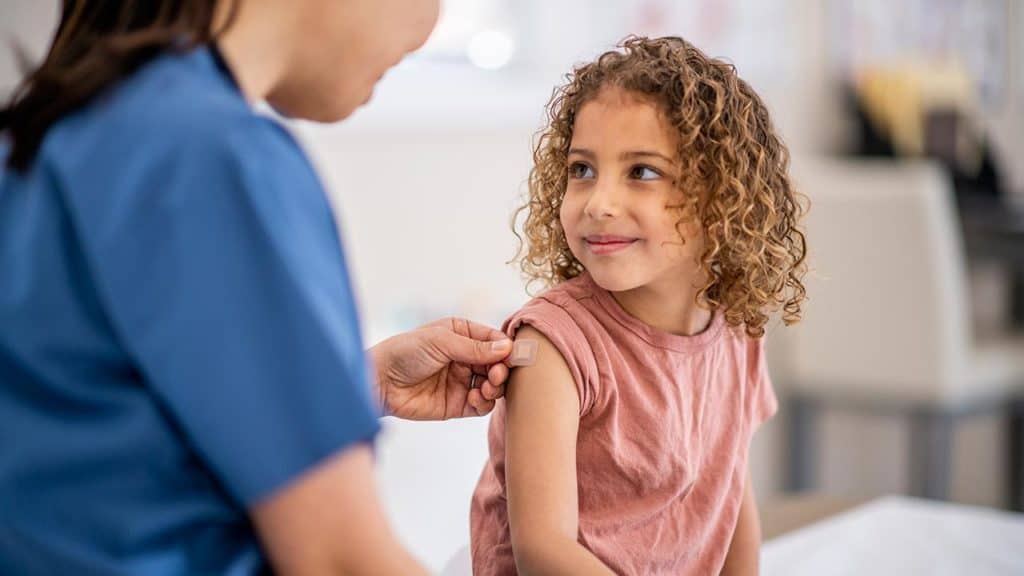Getting Kids Vaccinated Is Crucial, And Why So?
Nikki Attkisson | Last Updated : June 16, 2021An expert advises parents that COVID-19 injections are safe and effective for children aged 12 and up.
While the Pfizer vaccine is licensed for emergency use in this age range in the United States, parents may want reassurance, according to Dr. Jessica Ericson, an infectious disease physician at Penn State Health Children’s Hospital in Hershey.
Getting Kids Vaccinated Is Crucial, And Why So?
The immunizations were subjected to extensive testing and were confirmed to be safe, she added in a hospital press statement. It is understood that people are concerned about long-term impacts because the vaccinations have only been in trials for nine months to a year, but the bulk of side effects occur in the first few days to three months, and all are well past that now.

The potential adverse effects in children are the same as in adults. Low-grade fever, body pains, weariness, and soreness at the injection site are among them. Parents should call a doctor if their kid develops symptoms that extend more than two days, such as a temperature of 102 degrees or higher, according to Ericson.
There have been a dozen or so instances of heart irritation (myocarditis) in children following vaccination, but she says it’s unclear if there’s a direct relation.
According to Ericson, the vaccine is safe for children with allergies or chronic health concerns, and it may be given with other childhood vaccines.
An adolescent vaccination experiment revealed no adverse effects or problems, and the vaccination was shown to be 100 percent effective in 12- to 15-year-olds – a higher rate than in adults.
In the trial group of 1,000 teenagers who received the vaccination, none received COVID-19, compared to 16 youths in the placebo group of 1,000 who had COVID, Ericson explained.
Still, some parents may be hesitant to get their children vaccinated since they’ve heard that youngsters don’t become sick as readily with COVID-19 or transmit the virus as quickly as adults.
It is true that children are less likely to become really ill or die as a result of COVID-19, but even healthy youngsters can become very unwell and end up in the hospital, Ericson added, because the pandemic hasn’t ended, it’s essentially a decision between getting natural COVID or receiving the vaccination, and all knows that the chances of having a major response to the vaccination are significantly lower than the chance of major sickness from COVID.
Another advantage is that vaccinated children are unlikely to be quarantined if they are exposed to COVID, which means they won’t have to miss out on team sports or stop visiting friends or grandparents.
Getting vaccinated is the best and quickest method to get back to normal life, Ericson explained.
To help prevent against COVID-19, the CDC advises that everyone aged 12 and above receive a COVID-19 immunization. Vaccination is a vital weapon for halting the epidemic. People who have been properly immunized can continue their normal activities.
Getting vaccinated against COVID-19 can help protect children from contracting the virus. According to preliminary data, the immunizations may help prevent people from transferring COVID-19 to others. They can also help protect children from being extremely ill if they do contract COVID-19. Vaccinating oneself and their children aged 12 and up against COVID-19 to help protect their entire family is crucial.
Following COVID-19 immunization, the CDC has reported a rise in reports of myocarditis and pericarditis in adolescents and young adults. COVID-19 immunization has known prospective benefits that outweigh the known and prospective dangers, including the risk of myocarditis or pericarditis. It is continuously recommended that COVID-19 immunization for everyone aged 12 and up is required.
There might be side effects. These adverse effects may impair a child’s ability to do daily tasks, but they should subside after a few days. Some individuals have no negative effects.
One should inquire with the kid’s healthcare professional about utilizing a non-aspirin pain medication and other measures that one may take at home to soothe the kid. It is not advised to use painkillers before to immunization in order to avoid negative effects.
With over 15 years as a practicing journalist, Nikki Attkisson found herself at Powdersville Post now after working at several other publications. She is an award-winning journalist with an entrepreneurial spirit and worked as a journalist covering technology, innovation, environmental issues, politics, health etc. Nikki Attkisson has also worked on product development, content strategy, and editorial management for numerous media companies. She began her career at local news stations and worked as a reporter in national newspapers.